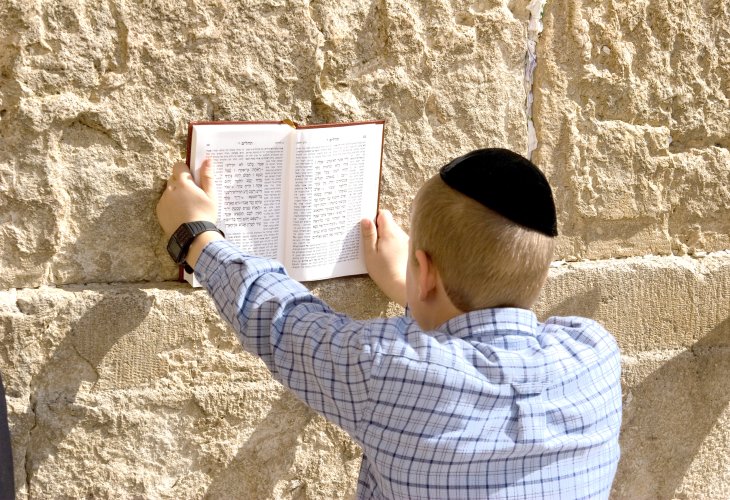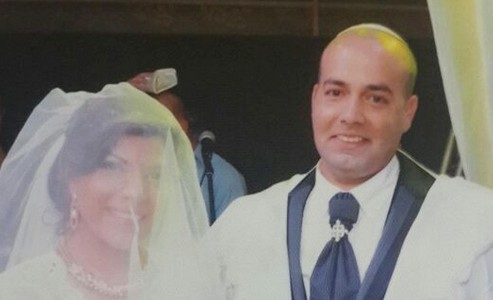Tair Abudraham: "I Choose Life"
Widowed at 28 and holding onto faith despite a challenging personal story. "I don't let my soul and heart fall. They are always directed towards Hashem," declares Tair Abudraham from Kiryat Shmona. Shira Cohen came to interview and strengthen her, but left with strength from this interview.

Everything about this interview gave me a different feeling. From the moment the young woman greeted me with a broad smile and kind eyes, who didn't stop praising Hashem even after the hardest trial in her life, I couldn't help but wonder: Where does this 28-year-old widow draw her phenomenal strength of faith from, and how did it happen that I came to strengthen her but left strengthened myself?
Until a year and a half ago, Tair Abudraham's (formerly Tayeb) life, a certified therapist from Kiryat Shmona, flowed peacefully. She worked steadily and felt she had everything: a good family, health, friendships, and even... a segment of spirituality (as five years earlier, she had started to reconnect with her Jewish roots—keeping Shabbat, kosher, and more).
Then she met Yuval Abudraham. "Even before I met Yuval, I felt it was time to get married," Tair recounts with a faithful tone mixed with a tinge of still-unhealed pain. "So I tried not to reject and met everyone who was introduced to me. With Yuval, I had one conversation on the phone, but for some reason, during that call—something in me didn't quite connect to him."
Nevertheless, as someone who habitually gave a chance and didn't immediately rule out, she decided to give him a chance and go on a date. Before leaving for the match, she took the Book of Psalms and offered a pure prayer before the Creator: "Please Hashem, if Yuval is my soulmate from the root of my soul and my destiny—give me a sign that you hear my prayer."

To her surprise, her eyes fell on the first verse that randomly opened: 'If I forget you, Jerusalem – may my right hand forget.' At that moment, Tair knew a clearer answer than this—she wouldn't get, and they met. But even at the meeting, the evil inclination didn’t stop employing its tricks on her and repeatedly tried to convince her with messages like: 'He's not for you,' 'He's not your style,' and so forth. A few days later, the inclination managed to defeat her, and she decided to give up on the match.
As if knowing this wouldn't be the last time they met, Yuval said nothing. From this moment, in a completely miraculous way, Abudraham felt Hashem's hand guiding her back to him, unwittingly. "I started getting recommendations about him from all sorts of directions, and they just wouldn’t let it go. For more than a month, I didn't stop hearing his name."
Apparently, her sister knew Yuval's family closely and refused to give up. She insisted on a second meeting, and there… Tair felt completely different. "Suddenly, all the barriers that were there before broke down, and I felt a different kind of connection to this person. After a few more meetings—it was already clear to both of us the direction, and we started planning the wedding."
Let's go back a bit—to the early period of their acquaintance. Only a month after they met, Yuval's father was injured at his workplace and rushed to intensive care at Rambam Hospital in Haifa. These were tough days for Yuval, who had to balance investing in the relationship with Tair while making weekly trips — including Shabbat and holidays. Who, if not the devoted son with a warm heart, would care for his father, assist, and alleviate his great pain?
The Father Passed Away a Month Before His Son's Wedding
The future seemed open and full of surprises and hope, prayers, and aspirations (or so it seemed at first). But this heartwarming feeling was abruptly cut short when Yuval's father passed away just a month before their wedding, painfully not seeing his son, the apple of his eye, under the chuppah. Yet, despite the pain and sorrow, life continued as usual even after his death.
There's a saying that a man's wife serves as the reflection of how he behaves with others – whether good or not. Abudraham reinforces this saying and emphasizes that the challenges every normative couple experiences in the first year of marriage, Yuval, and she did not experience at all. For even after their wedding, Yuval revealed himself as a true person of kindness, first tending to his home and wife. "Who better than I to know the immense challenge he had faced dealing with the vast emptiness that opened in his life since his father's death, but even in his more challenging moments, Yuval knew how to hide the pain from my eyes. It was so important for him to make me happy, to the point that today I can testify about him," Abudraham wipes away a stray tear from her eyes as she looks up, "that he merited fulfilling the commandment of the Rambam – 'Love her as himself and honor her even more than himself' – as he should. Despite the grief he experienced from his father's death, he did everything possible to ensure our home was happy, and the Shechinah dwelled between us. He never raised his voice at me, never got angry. He knew how to give respect and always found a way to uplift my spirits and make me happy. And I will thank him all my life."

So yes, it turns out there are such people, no matter what they go through in life – they will always know how to be there for someone else. Hence, even when they are not physically beside you, something of them always hovers in the air. Always accompanying you, wherever you go. That was her Yuval, whose noble character, pure faith, and love for Hashem were revealed precisely in his hardest moments.
Hashem Gave, Hashem Took – May the Name of Hashem Be Blessed
After the year of mourning for his father and close to their first wedding anniversary, Yuval surprised with a nice wedding gift: a vacation at a hotel in Jerusalem. Abudraham herself also surprised with a simpler gift – a beautiful gratitude notebook summarizing the wonderful experiences she had known beside him over the past year. Who would have believed that this notebook would soon become the only memory left and be engraved in her mind forever?
The vacation ended, and both returned to routine.
A few days later, Yuval felt terrible headaches and decided not to go to work. "For a week, we went from specialist to specialist – and no one could explain what Yuval was suffering from. When his condition worsened, we went down to the emergency room at the 'Poriah' hospital in Tiberias. The nurse measured Yuval's blood pressure, noted that he suffered from high blood pressure, and that was it." I am on edge.
What do you mean, that's it?
Abudraham breaks into tears. "After the blood pressure check, another nurse suggested they do general tests, but the attending doctor decided there was no need and signed a discharge form, when in fact she needed to hospitalize him and seriously address his pain."
A few days after the discharge, during another exhausting workday with phone calls and anxious clients – Yuval was rushed again to the 'Poriah' hospital, this time by a work colleague. It turned out that he was suffering from what is professionally called 'intracranial hemorrhage.' Due to the severity of his condition, no one objected when he was urgently brought in for tests. It was decided that urgent surgery was needed, but sadly – it was already too late . "Luckily, I managed to get to the hospital just before they took Yuval into the operating room," recalls Abudraham, "but due to the sedative drugs he was given, he couldn’t speak to me. I looked into his eyes and whispered 'I love you,' but never imagined... I couldn’t know that this is how it would end."
After the surgery, Yuval survived the following day and a half, then passed away.
Tair pulls another tissue from the box in front of her, wiping the tears streaming one after the other. "At least he passed away knowing I love him, and at least I was blessed with him for this year – that's something. Hashem gave, Hashem took, may the name of Hashem be blessed. Thank you, Hashem."

"I Want to Serve Hashem the Way Yuval z"l Served Him"
We hold hands, and I cry with her. How can one not? What immense strength lies in this woman – who, in her hardest moments, still manages to thank Hashem for this difficult trial.
Where does the strength come from?
"Only from Hashem. Now, in this difficult trial – I'm discovering my real strength. A person does not know how strong they are until they have to stand in difficult trials, G-d forbid. Being strong is something that's inherently within us – whether we want to or not. Besides, now my real service to Hashem is being measured. Yes, now, after I've seen the best example, in the one I was married to for a year.
"It’s strange to say this, but during the mourning year for his father – Yuval almost prepared me for what I’d have to face in the future. Though he was then going through a hard time, as he was very attached to his father, he made sure to strengthen and encourage us with talks of faith and love for Hashem and never expressed any anger about how Hashem was handling things with him. On the contrary. That was precisely when he intensified his mitzvah observance—distributing holy books in his father's memory, holding Torah lessons at our home, donating to the renovation of the neighborhood synagogue, and more.
"Today, I feel that Hashem is addressing me in my trial, telling me: 'Tair, do you remember how Yuval handled his grief with strength and faith? I didn't let you witness how a believing person deals with grief for nothing. The purpose was to teach you the lesson you'd have to apply yourself, because soon – I'm taking Yuval away from you permanently.' I had the best example, so why shouldn't I follow his path and continue to sanctify Hashem's name?" she says.
Praying to Do Hashem's Will – With All the Challenges and Pain
Suddenly, her gaze is lifted upwards. Distant and fragile, as if it has been thrown to a faraway point from the realms of this world’s pain. "With all the challenges and pain, which is something that accompanies you all your life," she says thoughtfully, "I would like to always go in Hashem's path. Because when you are with Hashem in your trials, it's like taking the pain and watering it and growing something else from it. I pray to withstand the trial to elevate myself spiritually, and if I succeed in elevating others with me – that will be my reward."
I am impressed, but Tair quickly cools my enthusiasm: "Don't attribute goodness to yourself – for this you were created," she says with unmistakably humble intonation, "if I have the opportunity to take my husband's death and grow spiritual strength for the people of Israel, then that's what I wish for myself. Yuval will never be forgotten and will always be a part of me and my soul. Today I understand that Hashem loaned him to me for a short period, and now He wants me to remember this period and make the best of it."
And now – what are you praying and hoping will happen in your life?
"Today I try with all my might to cling to what Yuval taught me – it's okay to cry sometimes, it's okay not to understand, it's okay to feel weak – but let the heart always follow the Creator of the world because there is nothing else. Before I met Yuval, I prayed for a partner. When I met him, I prayed for fertility and material things like livelihood. Today – I pray to do the will of Hashem. Being a widow at 28 is not just coping with being a widow, but dealing with everything together – with the questions and fears, doubts, and thoughts. And I can't say I never have moments of downfall. I do allow myself to fall, to get angry, to cry. But I don't allow my soul and heart to fall. They are always directed towards Hashem, telling Him every moment what I'm going through. Instead of succumbing to self-pity and meaningless questions of 'Why did this happen to me,' I choose life and faith. This is the least I can do to thank Yuval for the important lesson I learned from him in life: Not everything is good – but everything is for the best."

